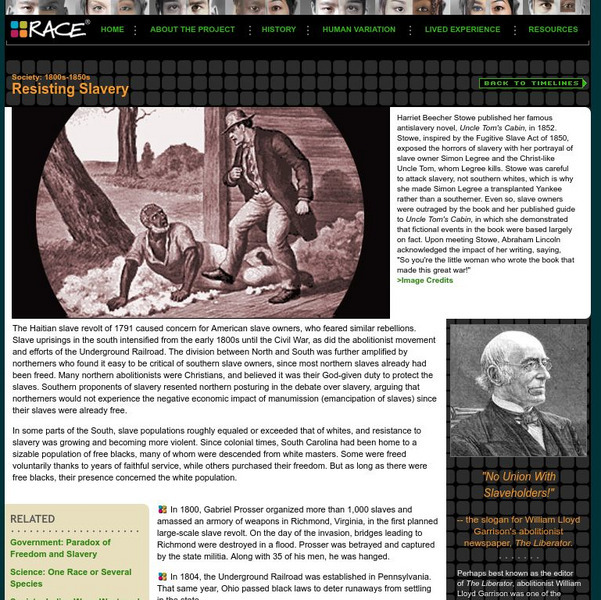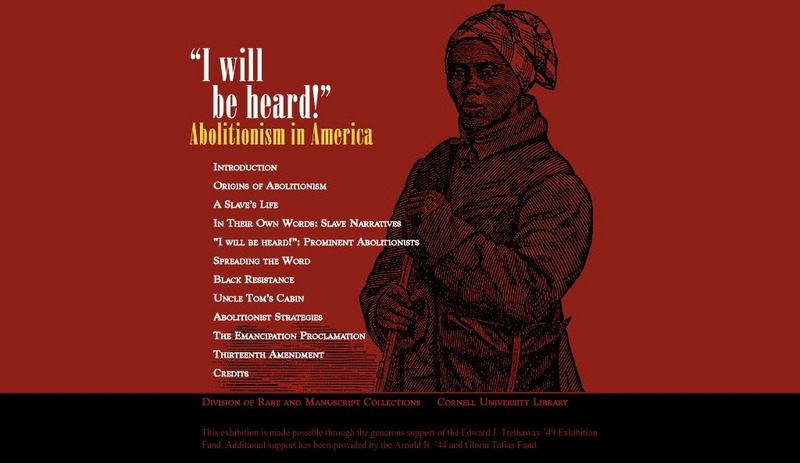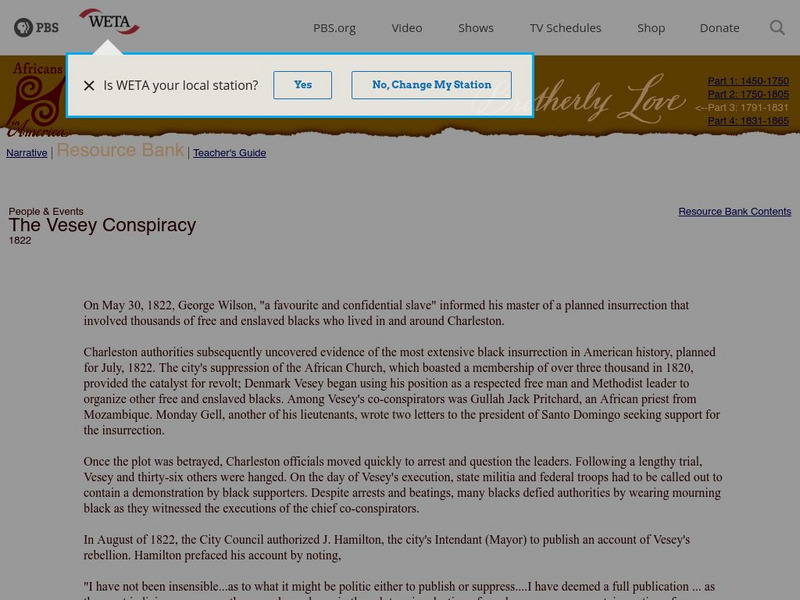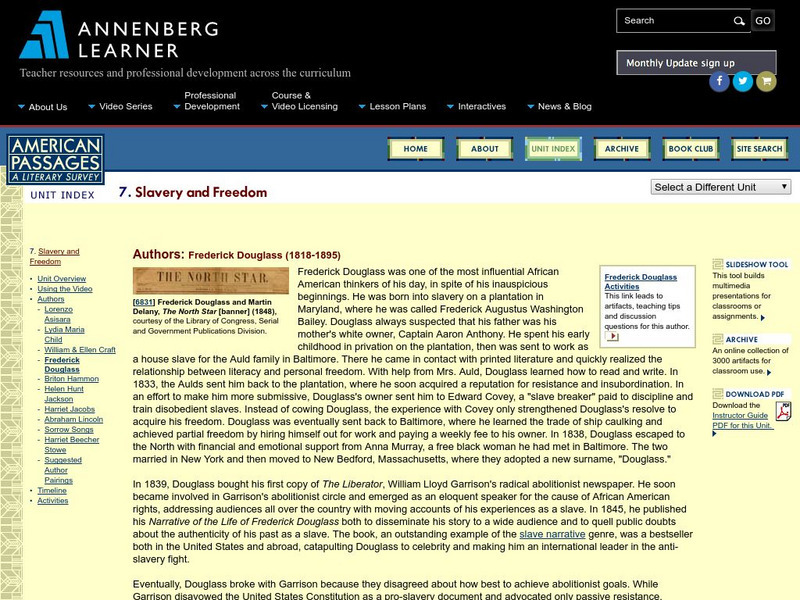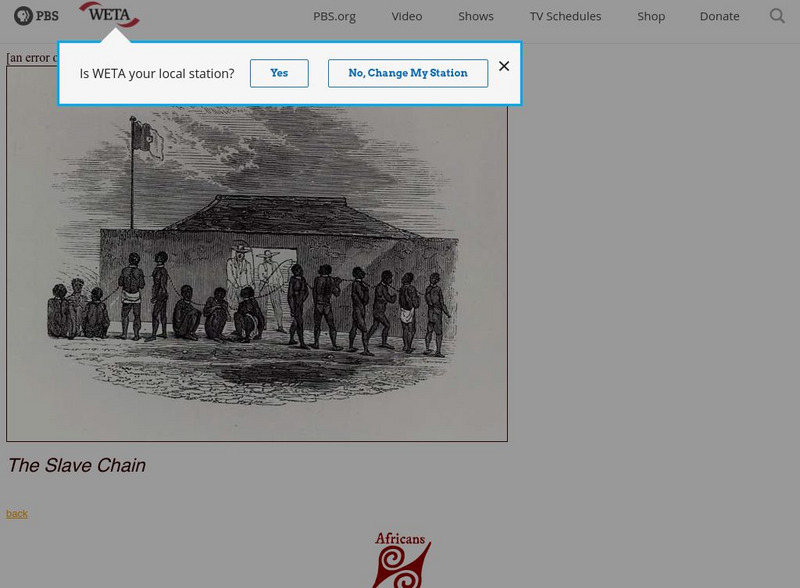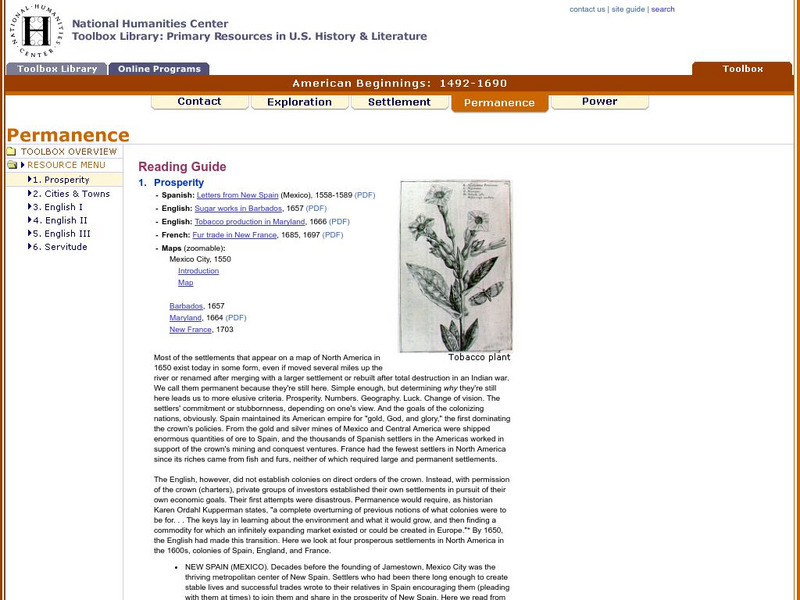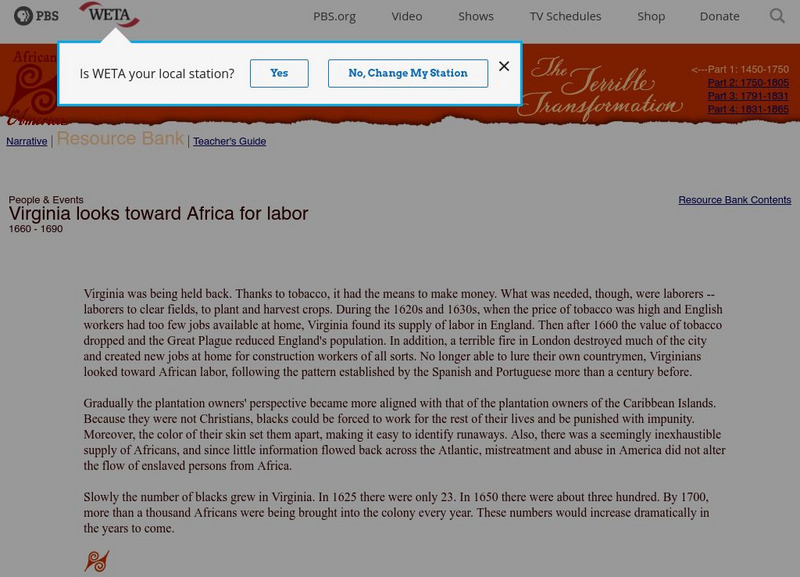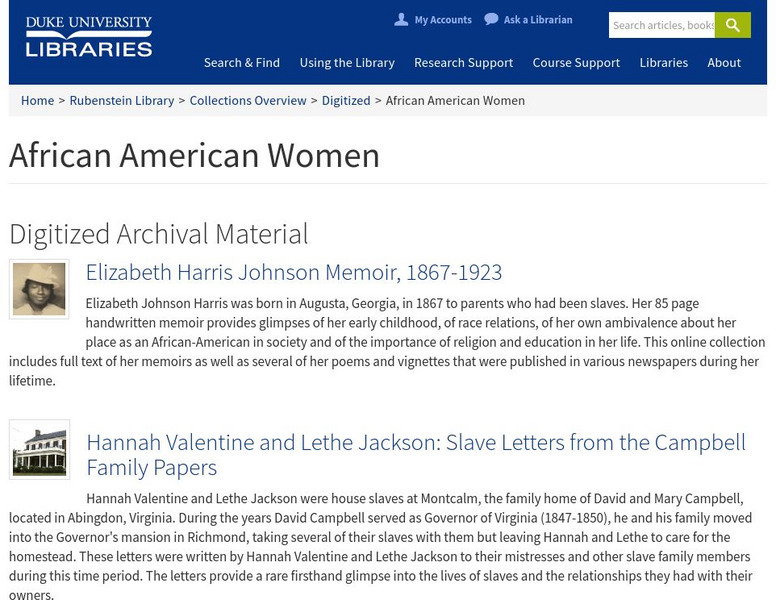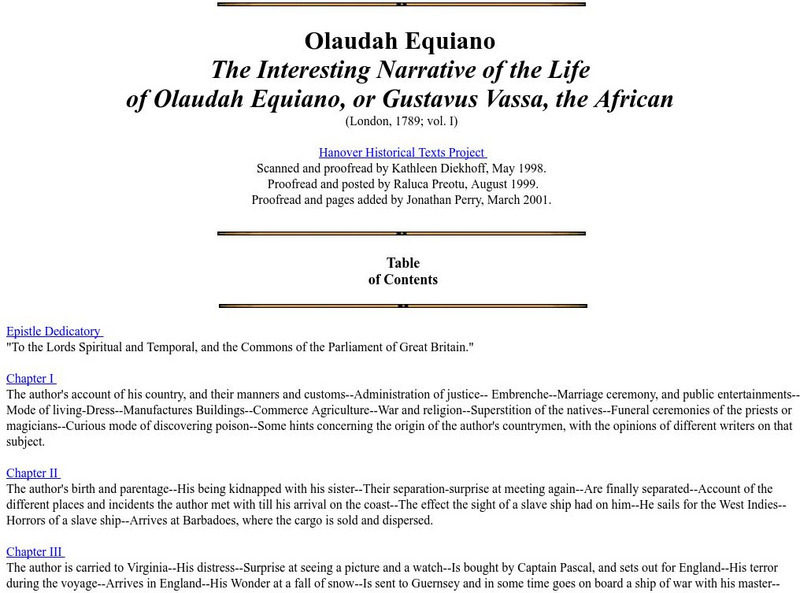Hi, what do you want to do?
Other
Understanding Race: Society: 1800 1850s: Resisting Slavery
An overview of slave revolts and abolitionist efforts during the first half of the nineteenth century, leading up until the Civil War. Read about the Underground Railroad, the colonization movement, and various anti-slavery books.
Other
Book Review: Becoming America:the Revolution Before 1776
A detailed review by James T. Kloppenberg, constructively criticizing the author's (Jon Butler) thesis that ties between colonial religion and politics are exaggerated.
Cornell University
Cornell University: Library: I Will Be Heard! Abolitionism in America
A collection of original manuscripts, letters, photographs, rare books, and other materials on abolitionism from the 1700s through 1865.
PBS
Pbe: Cet: Africans in America: The Vesey Conspiracy
A detailed account of the Vesey Conspiracy with links to other primary source materials on the subject. Excellent resource!
PBS
Pbs: Cet: Africans in America: Arthur Middleton
This instructional activity describes the rice cultivation on Arthur Middleton's South Carolina plantation and the importance of slaves to this cultivation. It also offers a description of the Middleton Family. Click on Teacher's guide...
PBS
Pbs: Africans in America: Part 3: Impact of the Cotton Gin
An African American associate professor of history at Cornell discusses the impact of the cotton gin on slavery.
Annenberg Foundation
Annenberg Learner: American Passages: Slavery and Freedom: Frederick Douglass
This concise biography presents author/journalist Frederick Douglass, who was groundbreaking in his slave narratives and establishing "The North Star" abolitionist periodical in mid-nineteenth-century America. See "Frederick Douglass...
PBS
Pbs: Africans in America: Angelina Grimke Weld's Speech at Pennsylvania Hall
The text of a speech given by abolitionist Angelina Grimke Weld on May 17, 1838.
PBS
Pbs: Africans in America: The Slave Chain
A close up picture providing an example of what a slave chain looks like. Click on Teacher's Guide for teacher resources.
iCivics
I Civics: Slavery: No Freedom, No Rights
From the basics about slavery to the attitudes that defended it and the efforts of those who wanted to see it abolished, in this lesson students learn about this dark part of America's past.
National Humanities Center
National Humanities Center: Toolbox Library: Prosperity, American Beginnings: 1492 1690
Four original source accounts, and four related maps, of successful English, French, and Spanish settlements in North America and the Caribbean that explain the qualities of these settlements and their reasons for permanence and prosperity.
PBS
Pbs: Africans in America: Slavery and the Origins of the Civil War
An article by Columbia University historian Eric Foner that discusses how long-standing views of the role of slavery in America began to be challenged during the civil rights era of the 1960s by a new generation of historians, whose work...
PBS
Africans in America: Virginia Looks Toward Africa for Labor
This website explains why Virginia needed laborers, why it led to the use of African labor and how it was justified by Christians. Hyperlinks to related topics on the site.
Other
Encyclopedia of American Foreign Policy: Civil War Diplomacy
An article by noted historian, Kinley Brauer, discusses the role of foreign policy for both the North and the South in the Civil War. An interesting, and often forgotten, aspect of the war.
Duke University
Duke University Libraries: Digitized Collections: African American Women
Access Civil War-era documents that give us a rare first-hand glimpse into the lives of African American women at the time: letters of two slave women from the 1830s and 1850s and a hand-written memoir of another woman born shortly after...
CommonLit
Common Lit: "A Nation Divided: North vs. South" by Us history.org
The American Civil War was fought within the United States from 1861 to 1865. The election of President Abraham Lincoln in 1860 increased tension between the North and South. Lincoln's political party was interested in stopping the...
A&E Television
History.com: Black History Milestones
A detailed account of the history of African Americans is presented in this article. Divided by main topics or periods of time, the coming of slavery to America is the first focus. Followed by plantation life and escapes to freedom and...
Gilder Lehrman Institute of American History
Gilder Lehrman Institute: Ap Us History Study Guide, Period Five: 1844 1877
[Free Registration/Login Required] Advanced Placement U.S. History learning module on Civil War era America and the transformation of society, 1844-1877. Comprehensive study tools include videos, essays, primary source documents, and...
Other
Institute of Texan Cultures: Indi Visible: African Native American Lives [Pdf]
A collection of lessons to accompany an exhibit, available online, that examines the shared history and heritage of African Americans and Native Americans. Both groups were faced with exclusion from society and often joined together, in...
Hanover College
Hanover College: Slave Narrative of Olaudah Equiano Vol. 1
The complete text of a famous slave narrative from the late 18th century (1789), it tells the story on how Equiano is captured in Africa, transported to the Americas and his experiences as a slave. It provides rich details about the...
Read Works
Read Works: Primary Source Texts About Slavery
[Free Registration/Login Required] This nonfiction passage provides two stories about slaves in America with question sets. This passage uses primary source documents to teach reading skills including comparing and contrasting.
PBS
Pbs: Africans in America: David Walker (1796 1830)
At this site from PBS you can read about the life of David Walker. Born in the late 18th century as a free black, he was most known for his pamplet, entitled "Appeal," which advocated slave revolt.
National Humanities Center
National Humanities Center: Toolbox Library: William Seward, Triumph of Nationalism: America, 1815 1850
The National Humanities Center present a reading guide that links to a speech in the Senate by William Seward, one that expresses moral outrage over the compromises allowing the expansion of slavery.
Understanding Slavery Initiative
Understanding Slavery Initiative: Atlantic Crossing: Slave Forts Case Study
Find out about the disparity between the castle-like headquarters of slave forts and the deplorable conditions in which enslaved Africans lived while waiting to be transported by slave ship to the Americas.





